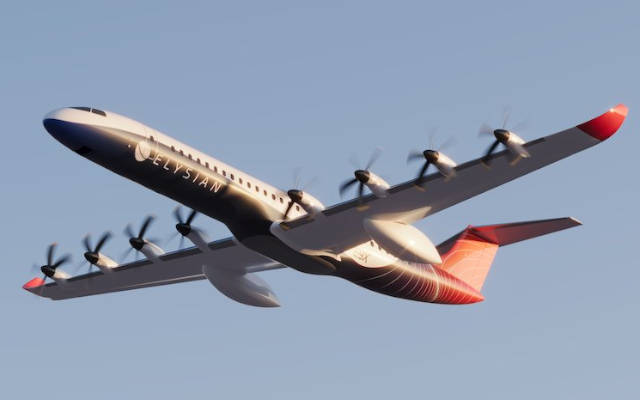Elysian E9X: Europe's 90-Seat Electric Aircraft Targets 2033 Entry

By EVWorld Si | July 30, 2025
In the shadow of Amsterdam's Schiphol Airport, Dutch startup Elysian Aircraft is drawing global attention with its ambitious project to deliver a 90-passenger, fully electric narrow-body aircraft - called the E9X - by 2033. Capable of flying 500 miles on a single charge, the E9X is designed to offer a zero-emission solution for short-haul flights at nearly half the capacity of current Boeing 737 or Airbus A320 jets.
Defying Skepticism With Scale
While other startups such as ZeroAvia and Vaeridion focus on smaller 9- to 19-seat electric aircraft, Elysian is taking a bold leap into mid-sized commercial aviation. Despite industry doubts, Elysian has completed early design validation in collaboration with Delft University of Technology and now enters the detailed design phase with a growing team of engineers.
Engineering the Future
The E9X features distributed electric propulsion with eight propellers—four on each wing—powered by batteries integrated into the wing structure. These batteries will feed eight 1.3 MW electric motors. The aircraft is expected to have a wingspan of over 42 meters, wider than today’s narrow-body jets, with a streamlined fuselage to enhance aerodynamics.
Overcoming “Hot Potatoes”
Elysian’s founders tackled ten major technical challenges—nicknamed “hot potatoes”—in collaboration with aerospace experts and academics. Most of these have now been addressed, paving the way for ongoing detailed design work and eventual prototyping.
Strategic Partnerships
To advance development, Elysian has partnered with Spain’s Aernnova for wing studies and Dutch carrier KLM and its low-cost arm Transavia for a knowledge-sharing initiative. The startup also shares space with Fokker Services and maintains strong academic ties.
Path to Commercialization
Elysian plans to build a full-scale prototype by 2030, with service entry targeted for 2033. With a recharge time under 45 minutes and potential onboard turbogenerator backup, the E9X is poised to serve short-haul routes efficiently and sustainably. The project will require an estimated $350 million for the prototype and up to $10 billion to reach full production.
Vision for a Cleaner Sky
The company believes electric aircraft like the E9X could replace up to 50% of current flights, drastically cutting aviation emissions. While acknowledging challenges such as airport infrastructure and industry resistance, co-CEO Rob Wolleswinkel remains confident: “Zero carbon electric aircraft are the future of the aviation industry.”
Sources
- Forbes: Narrow-Body Electric Aircraft Not a Fantasy
- Elysian Aircraft Official Website
- TU Delft Aerospace Research
- KLM Newsroom: KLM & Transavia Join Elysian
- Aernnova LinkedIn Announcement
Original Backlink
Views: 182
Articles featured here are generated by supervised Synthetic Intelligence (AKA "Artificial Intelligence").
